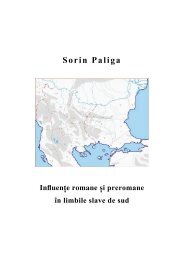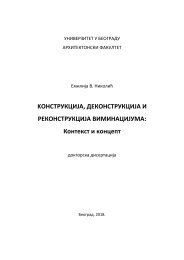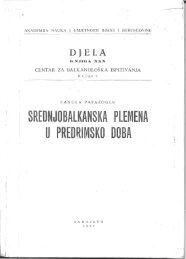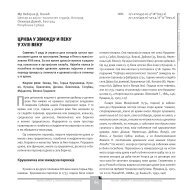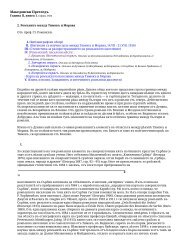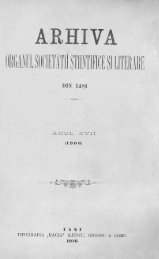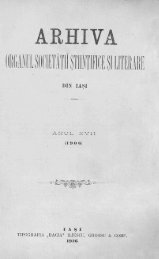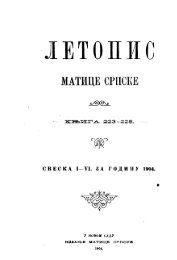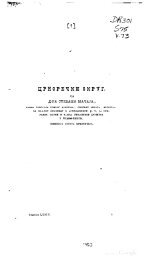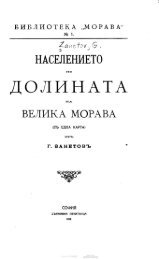The Construction of National Identity and its Challenges in Post-Yugoslav Censuses
You also want an ePaper? Increase the reach of your titles
YUMPU automatically turns print PDFs into web optimized ePapers that Google loves.
898 Social Science Quarterly<br />
TABLE 7<br />
Incongruent <strong>National</strong> <strong>and</strong> Religious Identities <strong>in</strong> Montenegro <strong>and</strong> Croatia, 2011<br />
Croatia<br />
Montenegro<br />
Percentage <strong>of</strong><br />
Percentage <strong>of</strong><br />
Numbers <strong>National</strong> Category Numbers <strong>National</strong> Category<br />
Non-Catholic Croats 275,283 7.1 494 8.2<br />
Non-Orthodox Serbs 27,103 14.52 3,058 1.71<br />
Non-Orthodox Montenegr<strong>in</strong>s 2,695 59.66 32,132 11.52<br />
Non-Muslim Bosniaks 3,520 11.18 152 0.28<br />
<strong>in</strong>dicate that they are agnostics or atheists) or those choos<strong>in</strong>g a religion not conventionally<br />
associated with the national identity <strong>of</strong> choice (e.g., Serbs <strong>in</strong>dicat<strong>in</strong>g that they are Catholic)<br />
(Table 7).<br />
Accord<strong>in</strong>g to the data from Croatia <strong>and</strong> Montenegro, 7.19 <strong>and</strong> 5.76 percent <strong>of</strong> the<br />
populations, respectively, do not follow the established l<strong>in</strong>k between religion <strong>and</strong> national<br />
identity. Among those opt<strong>in</strong>g out <strong>of</strong> the dom<strong>in</strong>ant national religion, most identify as<br />
atheists or agnostics. A total <strong>of</strong> 4.57 percent <strong>of</strong> Croat citizens <strong>in</strong>dicate that they are agnostic<br />
or atheists. <strong>The</strong> share <strong>of</strong> atheists or agnostics among Croats is slightly lower than among<br />
all at 3.92 percent. Among Croatian Serbs, the share <strong>of</strong> atheists st<strong>and</strong>s at 10.44 percent,<br />
a surpris<strong>in</strong>gly large number consider<strong>in</strong>g the common assumption that religious markers<br />
matter more among m<strong>in</strong>orities. <strong>The</strong> picture among other m<strong>in</strong>orities <strong>in</strong> Croatia is mixed,<br />
with some similar to the Serb m<strong>in</strong>ority (e.g., Italians), <strong>and</strong> others exceed<strong>in</strong>g Croats <strong>in</strong><br />
levels <strong>of</strong> religious affiliation (e.g., Hungarians). In Montenegro, a more traditional society,<br />
the share is somewhat lower, with only 1.3 percent <strong>of</strong> the population be<strong>in</strong>g atheists or<br />
agnostics. <strong>The</strong> highest rates are among Montenegr<strong>in</strong>s (2.23 percent) <strong>and</strong> the lowest among<br />
Bosniaks <strong>and</strong> Albanians (0.008 percent <strong>and</strong> 0.01 percent, respectively). However, there<br />
are substantial numbers who opt for other major religions, such as some 6.6 percent <strong>of</strong><br />
Montenegr<strong>in</strong>s <strong>in</strong> Montenegro who are Muslims or Catholics, <strong>and</strong> 0.68 percent <strong>of</strong> Croats<br />
<strong>in</strong> Croatia who are Orthodox or Muslims.<br />
<strong>The</strong>re is no s<strong>in</strong>gle cause <strong>of</strong> why <strong>in</strong>dividuals opt out <strong>of</strong> the established identity categories.<br />
As noted <strong>in</strong> the U.S. context (Rockquemore, Brunsma, <strong>and</strong> Delgado, 2009), these<br />
<strong>in</strong>dividuals cannot be understood as a s<strong>in</strong>gle community, even if the label <strong>of</strong> <strong>Yugoslav</strong><br />
identity to encompass many <strong>of</strong> them had still been available. Markowitz has noted <strong>in</strong> her<br />
research on identity categories <strong>in</strong> Sarajevo that a substantial number <strong>of</strong> citizens identify<br />
themselves as Bosnians <strong>and</strong> reject the ethno-nationalist labels imposed on them because<br />
<strong>of</strong> the consequences <strong>of</strong> the war <strong>and</strong> the Dayton power shar<strong>in</strong>g structures (2007). In addition,<br />
a number <strong>of</strong> cases exam<strong>in</strong>ed here <strong>in</strong>dicate citizens who def<strong>in</strong>e their identity <strong>in</strong><br />
ethno-national categories, but do not accept the terms <strong>of</strong>fered by elites. For example, <strong>in</strong><br />
Montenegro, the ambiguity between Serbian <strong>and</strong> Montenegr<strong>in</strong> identity has been great ever<br />
s<strong>in</strong>ce the formal recognition <strong>of</strong> a Montenegr<strong>in</strong> nation <strong>in</strong> post-World War II <strong>Yugoslav</strong>ia.<br />
However, this identity was always viewed by the state, <strong>and</strong> many citizens, as be<strong>in</strong>g “th<strong>in</strong>”<br />
<strong>and</strong> shar<strong>in</strong>g many attributes with Serb identity. <strong>The</strong> nation-build<strong>in</strong>g process s<strong>in</strong>ce the late<br />
1990s, which resulted <strong>in</strong> Montenegro’s <strong>in</strong>dependence <strong>in</strong> 2006, produced a self-def<strong>in</strong>ed<br />
language <strong>and</strong> Orthodox Church, but many Montenegr<strong>in</strong>s reta<strong>in</strong> strong ties to Serbian<br />
identities, as do many Serbs who only “switched” from Montenegr<strong>in</strong> identity s<strong>in</strong>ce the<br />
1990s (Jenne <strong>and</strong> Bieber, 2014).






